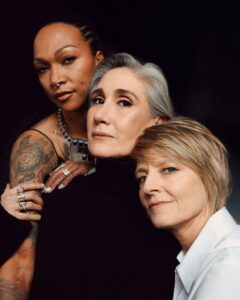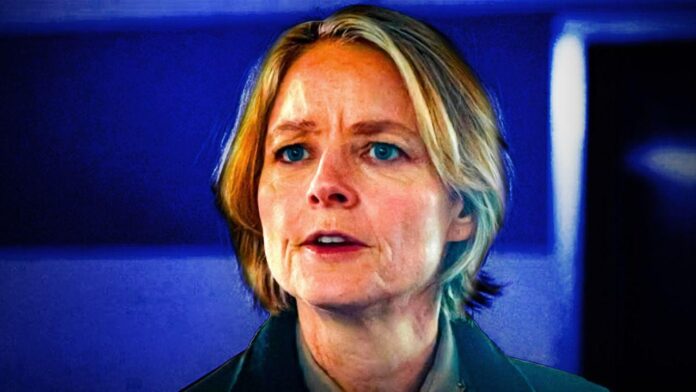Jodie Foster quietly donated $50,000 to an organization that supports abused women last October. A few months later, she received a letter from a woman named Maria, who said Jodie’s support had saved her from a life of pain. “Her message made me believe that I was worthy of love,” Maria wrote. For Jodie, it was just a donation — but for Maria, it was a chance to start over.
The envelope sat unopened on Jodie Foster’s desk for days, tucked between scripts and fan mail. It was a simple thing—plain white, slightly creased, with a return address from a women’s shelter in a small town she’d never visited. Jodie, a woman accustomed to the spotlight yet fiercely private, wasn’t one to dwell on her charitable acts. Last October, she’d quietly wired $50,000 to an organization supporting abused women, a donation made without fanfare or press releases. To her, it was a small gesture in a world of need, a drop in the ocean. But when she finally opened that envelope, the words inside would ripple through her heart, just as her donation had transformed a life.

Maria’s story began in shadows. At 32, she had spent a decade trapped in a cycle of abuse. Her husband, David, was a man whose charm had once dazzled her but had long since curdled into control and cruelty. The bruises on her arms were hidden under long sleeves, and the ones on her heart were buried deeper still. Maria had stopped dreaming years ago. Her days were a blur of fear, tiptoeing around David’s moods, her world shrinking to the walls of their cramped apartment. She’d forgotten what it felt like to feel safe, to feel worthy.
The turning point came one rainy night when David’s temper flared over a spilled glass of water. Maria fled, barefoot, into the storm, her only thought to survive the night. She found herself at a women’s shelter, a place she’d heard of but never imagined she’d need. The shelter was a modest building, its paint peeling but its doors open. Inside, a counselor named Sarah welcomed her with a blanket and a cup of tea. “You’re safe now,” Sarah said, and for the first time in years, Maria dared to believe it.
The shelter was more than a roof—it was a lifeline. Funded partly by Jodie’s donation, it offered counseling, legal aid, and a chance to rebuild. Maria’s first weeks were tentative. She flinched at loud noises, her eyes scanning for threats. But the shelter’s staff was patient. They taught her to recognize her worth, to unravel the lies David had woven into her mind. “You are enough,” Sarah told her during one session, and Maria clung to those words like a raft in a storm.

Jodie’s $50,000 had arrived at a critical moment. The shelter had been struggling, its budget stretched thin. Her donation funded new beds, therapy sessions, and job training programs. For Maria, it meant a room of her own and access to a counselor who helped her name her pain. It meant a lawyer who secured a restraining order against David. It meant a laptop where she typed her first resume in years. To Jodie, it was just money. To Maria, it was the foundation of a new life.
Months passed, and Maria began to bloom. She enrolled in a community college course, her hands trembling as she filled out the application. She found a part-time job at a bookstore, where the quiet rustle of pages felt like a balm. She made friends—tentative at first, then fiercely loyal—who reminded her how to laugh. But the most profound change was internal. Maria began to see herself not as a victim, but as a survivor. She wrote in a journal every night, pages filled with dreams she hadn’t dared to dream before: a home of her own, a career, a life where love didn’t come with fists.
One evening, sitting in the shelter’s common room, Maria overheard a staff member mention Jodie Foster’s donation. The name struck her—not because of Jodie’s fame, but because of the quiet generosity. Maria had seen Jodie’s films, admired her strength on screen, but this was different. This was real. Moved, Maria sat down to write a letter. Her words poured out, raw and unpolished, but from the heart.
“Dear Ms. Foster,” she began, “I don’t know if you’ll ever read this, but I need you to know what your gift did for me. I was lost, broken, and thought I’d never escape the pain. Your support gave me a safe place to heal. It made me believe I was worthy of love—not just from others, but from myself. Because of you, I’m starting over. Thank you for giving me a chance.”
When Jodie read those words, tears welled in her eyes. She sat in her study, the letter trembling in her hands. She’d given money before—countless times, to countless causes—but this was different. Maria’s words were a mirror, reflecting the impact of a single act. Jodie had always believed in the power of small gestures, but she hadn’t realized how far they could reach. She tucked the letter into a drawer, not as a trophy, but as a reminder: every act of kindness, no matter how small, could light a spark in the dark.

Maria’s journey wasn’t without setbacks. There were nights when nightmares woke her, David’s voice echoing in her mind. There were days when self-doubt crept in, whispering that she’d fail. But she pressed on, fueled by the belief that she was worthy. She graduated from her course, landing a job as a library assistant. She moved into a small apartment, decorating it with secondhand furniture and bright curtains she sewed herself. Each step was a victory, a reclaiming of the life she’d thought was lost.
A year after her escape, Maria stood before a group of new arrivals at the shelter, sharing her story. Her voice was steady, her eyes bright with purpose. “You are not your pain,” she told them. “You are stronger than you know. And there are people out there—people you may never meet—who believe in you.” She thought of Jodie, a stranger whose kindness had changed everything.
Jodie, meanwhile, carried Maria’s letter in her heart. It reminded her why she gave—not for recognition, but for moments like this. She didn’t seek Maria out; that wasn’t her way. But she continued to give, quietly, to shelters and schools and hospitals, knowing that somewhere, another Maria was finding her way.
Maria’s story spread beyond the shelter. She began volunteering, then speaking at local events, her voice growing stronger with each telling. She became a beacon for others, proof that healing was possible. And though she and Jodie never met, their lives were intertwined by a single act of compassion—a donation that was just money to one, but a lifeline to another.
In the end, Maria’s transformation was more than personal. It was a testament to the power of belief—belief in oneself, sparked by the belief of others. Jodie’s gift had been a seed, and Maria had grown it into a life of purpose. Together, they proved that even in a world of pain, a single act of kindness could light the way to redemption.
